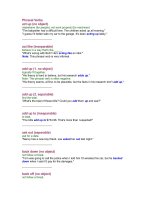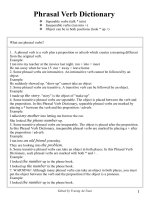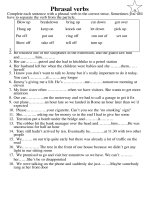MASTERING YOUR PHRASAL VERBS 1
Bạn đang xem bản rút gọn của tài liệu. Xem và tải ngay bản đầy đủ của tài liệu tại đây (258.09 KB, 2 trang )
WORK ON YOUR PHRASAL VERBS ~ BASIC ACTIONS
1. fall down. If someone or something falls down when they have been in an upright
position, they drop to the ground.
- He tripped and fell down.
2. get off. If you get off something that you are on, you move your body from it, usually
onto the ground.
- He got off his bicycle.
3. get out. If you get out, you leave a place or a vehicle.
- We got out of the car.
4. get up. [a] When someone or something gets up or gets up something, they move
from a lower position or level to a higher one.
- By the time we'd got up to the top of the hill, we were exhausted.
- I knew he would have difficulty getting up those steps.
[b] If you get up, you rise to a standing position after you have been sitting or lying
down.
- He got up off the floor.
[c] When you get up, or when someone gets you up, you get out of bed.
- She decided it was time to get up.
- We had to get the children up and dressed.
5. go back. If you go back, you return to a place where you were before.
- I have to go back to the US next week.
- It started to rain so I went back for my umbrella.
6. go in. When you go in, you enter a building.
- Let's go in and have some coffee.
- I pushed open the door of the office and went in.
NOTE. The opposite of go in is go out.
7. go into. When you go into a room, building, or area, you enter it.
- She went into the bedroom and shut the door.
8. go off. If you go off somewhere, you leave the place where you were, usually in order
to do something.
- He's gone off to work.
9. keep down. If you keep down or if you keep your head down, you stay in a lying or
low position in order to avoid being seen or attacked.
- The captain signalled to his soldiers to keep down.
10. lay down. If you lay something down, you put it down on a surface.
- He laid the baby gently down on the changing table.
11. move up. If someone or something moves up or moves up a place, they go from a
lower position to a higher one.
- The sun had moved up in the sky.
- We moved up the hill a few metres.
NOTE. The opposite of move up is move down.
12. run in. If someone runs in from outside a room or building, they enter it, moving
fast.
- I'll run in and get them.
13. run into. To run into a place means to enter it running.
- They had run into the nearest apartment and asked for help.
14. run on. If you run on, you continue to run in the same direction.
- Tran on ahead.
15. run out. [a] If you run out of a room or building, you leave it, running.
- He ran out of the room and down the stairs.
[b] If a substance runs out from somewhere, it flows from there.
- Water was running out from under the front door of the house.
16. sit down. If you sit down or sit yourself down, you lower your body until you are
sitting on something.
- We were both looking for a place to sit down.
- She sat herself down beside me.
NOTE The opposite of sit down is stand up.
17. stand up. If you stand up, you change your position so that you are standing rather
than sitting or lying.
- The pupils stand up when the teacher comes into the room.
NOTE. You can also use get up.
18. turn back. If you turn back or are turned back, you stop a journey and return
towards the place you started from.
- It was getting dark, so we turned back.
- We were turned back by heavy snow.
PRACTICE
I. Match verbs 1-5 with particles A-E to make phrasal verbs from this unit.
1. stand / move / get
A. back
2. lay / sit / keep
B. out
3. run / get
C. down
4. go / turn
D. into
5. run / go
E. up
II. Complete the sentences. Choose the correct particles.
1. We enjoyed it and would really like to go on /in / back one day.
2. Could you run into / away /in and get my glasses?
3. It started raining so they turned out/on / back and went home.
4. Charles went on / off/ into the shop and bought some water.
5. Grandma walked slowly, but the children ran on / with / onto.
6. Jack went onto / with /in and ordered a drink.
III. Match sentence halves 1-6 with A-F to make complete sentences.
1. Mrs Tam Vy came running out
A. to get ourselves up.
2. A lot of the people
B. and scattered all over the floor.
3. I remember running into
C. were turned back at the border.
4. I went back to the kitchen
D. and stood at the side of the road.
5. The pile of books fell down
E. the playroom in tears.
6. We had until 7:15
F. to continue cooking.
IV. Match each phrasal verb 1-4 with its opposite meaning A-D.
1. goin
A. move down
2. Move up
B. stand up
3. sit down
C. run out
4. run in
D. go out
V. Choose the best answer to complete the sentences.
1. After a while we all sat down / stood up / fell down to eat.
2. Someone fell down / stood up / went into in the middle of the hall and asked a
question.
3. She went into /sat down / got up and walked across the room.
4. She laid the book down / moved the book up / ran the book out on the table.
5.. [ran out / sat down / went into and slammed the door.
6.. I need to get off / get out / turn back of New York for a while.
VI. Complete the sentences with the correct form of the phrasal verbs in the list
below.
get off - run in - move up - lay down - get up - get out
1. Brody.................... of bed at 8:30 this morning.
2. I need to..................... early tomorrow for work.
3. He.................... through the open door and sat down in the living room.
4. I saw something..................... that tree over there.
5. I took a fifty dollar bill and.......... Ibe on the counter.
6. He...................... his stool and went to the door.
VII. Make these sentences less formal. Replace the underlined words with the
phrasal verbs in the box.
get up - go back - go into - move down - sit down — turn back
1. I forgot my glasses, so I had to stop and return home to fetch them.
2. Please do not enter the building without a permit.
3. In the winter, the goats descend the mountains from the high ground.
4. Are you planning to return to the UK after your trip abroad?
5. If you find it difficult to ascend the stairs, you are welcome to use the lift.
6. Please take a seat.
VIIL. Read the following safety advice from a ski resort website. Underline all the
phrasal verbs, then decide if the sentences that follow are true (T) or false (F).
SKI SAFELY
You must always sit down while using the chairlift.
If you fall down on the slope, or if you fall from the chairlift, do not get up too
quickly.
If you fall from the chair lift, keep your head down until it is safe to stand up again.
If you think you may be injured, lay your skis down on the ground and wait for help.
Always stay with another person. Do not go off on your own.
If it starts to snow heavily, you should consider turning back.
1. Always stand up on the chairlift.
2. If you are injured, ski to someone and ask for help. 1
3. It is safe to ski alone. L]
4. If it snows heavily, leave the slopes and return to your accommodation. ||
5. If you fall from the chairlift, get up quickly. LÌ
6. Keep you head down while on the chairlift. 1
H+ was hard for his mother
tp get him up in the morning.
~eKOKO
KL KOKO
ANSWER
KEY
I.
_1.E2C3.B4AS.D
II. 1. back 2. in 3. back 4. into 5. on 6. in
IH. 1.D2.C3.E4.F5.B6.A
IV. 1.D2.A3.B4.D
V.
1. sat down 2. stood up3. got up
4. laid the book down 5. ran out 6. get out
VI. 1. got out 2. getup 3. ran in
4. moving up 5. laid (at) down 6. got off
VII. 1. turn back 2. go into 3. move down
4. go back 5. get up 6. sit down
VI.
SKI SAFELY!
You must always sit down while using the chairlift.
If you fall down on the slope, or if you fall from the chairlift, do not get up too quickly.
If you fall from the chair lift, keep vour head down until it is safe to stand up again.
If you think you may be injured, jay your skis down on the ground and wait for help.
Always stay with another person. Do not go off on your own.
If it starts to snow heavily, you should consider turning back.
IF
2F3F4T
SF
6F








